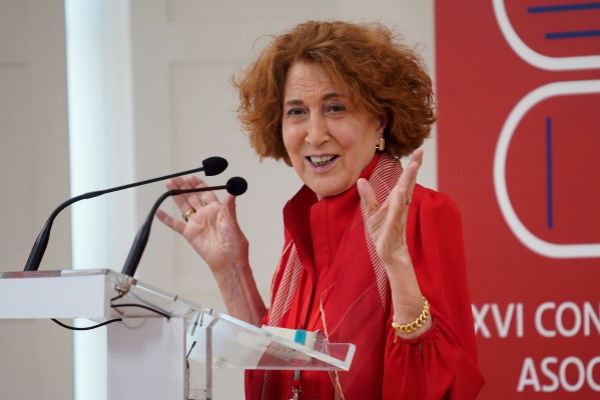Without the need to name the protagonists of today, everything else to Caro Baroja or Menéndez Pidal; nor to present facts, because the past may not be repeated, but it rhymes, as Mark Twain, the director of the Academy of History, Carmen Iglesias, said yesterday conducted an exercise with both resounding scholarship and refined elegance about the present of Spain and Catalonia .
The XVI Congress of the Association of Academies of the Spanish Language, which today the Kings of Spain close, made room for a scientist who has made history, in his case twice, because in addition to occupying the armchair and capital, it is the first female director of the Academy of History.
His curriculum almost covered more space than the small room in which it was explained with clear clarity regarding what he called "actuality", after admiring the figure of Ramón Menéndez Pidal . "A giant, the man who forever transforms philology and who cared for all peninsular languages, committed to dissemination, not for personal fame, but so that ignorance does not lead to damage to all," he said after the presentation by part of the academic and writer Luis Mateo, who lamented the death hours before Margarita Salas, also a language scholar.
Iglesias recommended reading The Spaniards in history , the "little great work" of the Coruña, to realize that it explains present events, for example the "how history is taught, how the truth of the memory of what happened is articulated, and how tell the truth of history, not to delve into the division of the Spaniards, but for a normalization of life ».
The historian insisted on the importance of language for the researcher. «The choice of words has ethical implications; the narrative modifies the perception of historical facts »and, if that happens, the next step is devastating: « A false story ends up being part of a collective fantasy that breaks coexistence » .
After defending Menéndez Pidal's thesis about the absence of conflict in the bilingualism of Spanish territories "until the arrival of nationalisms," Carmen Iglesias warned that democratic regimes "also try to manipulate the historical narrative." He appealed to Julio Caro Baroja, who said that he better take care of the "people of strong faith," by uniting the religious, patriotic, and political.
History is a science that brings "objective knowledge," he said. Iglesias recalled the anecdote of French Prime Minister Georges Clemenceau, who did not know who they would blame in the future of World War I, "but I am sure they will not say that Belgium invaded Germany." "When the facts are changed by opinions, you have to run," added the director of the Academy of History, "because the concealment of the facts, the lie, contains an element of violence."
"We must know that those who do not know History will be unable to improve the present, " he said before saying goodbye with a double reference: the quote from Saint Teresa of Jesus "the truth suffers, but does not perish" and the memory that, in Greek , the antithesis of truth is not a lie, but oblivion.
According to the criteria of The Trust Project
Know more- Spain
- Catalonia
- culture
- history
HistoriaPaul Preston: "Franco died, but Franco has survived, we are seeing these days"
Luis García Montero "Indigenous cultures were as brutal and cruel as Spanish culture"
30th Anniversary Vargas Llosa: "Spain and Latin America share a wonderful and thriving language"

